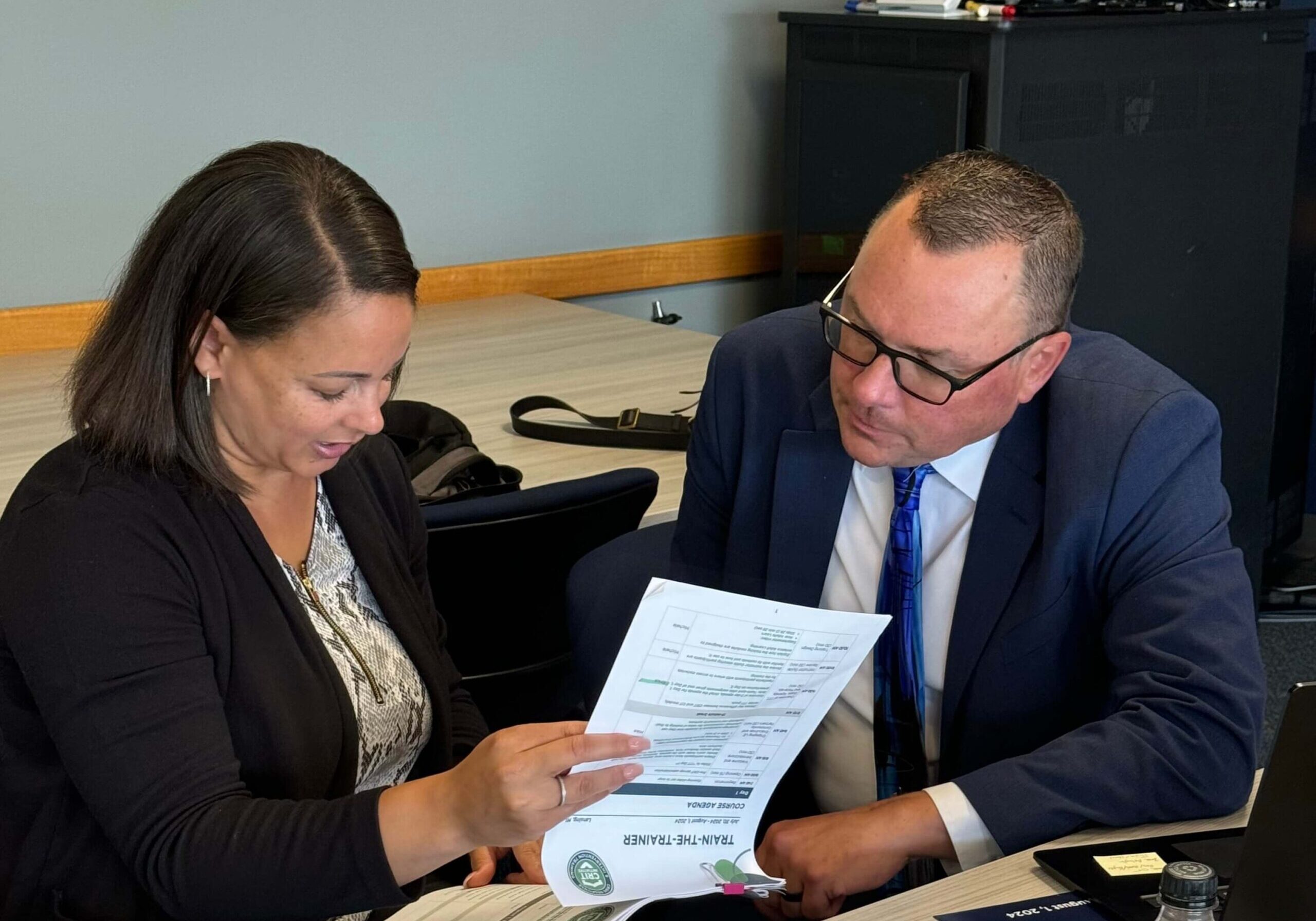Advancing De-escalation in Policing
Research-informed Strategies for Safer Outcomes
De-escalation in policing is a critical strategy for safely managing high-stress, potentially volatile interactions between law enforcement officers and the public. At the National Policing Institute (NPI), we are committed to strengthening how de-escalation is taught and applied, as well as building evidence on its impacts in the law enforcement profession. Through innovative research, model training programs, and national-level initiatives, NPI plays a leading role in shaping the future of de-escalation practices.
Our experts specialize in:
- Evaluating de-escalation training effectiveness
- Developing research-informed guidance and standards for de-escalation
- Creating real-world de-escalation training resources grounded in best practices
- Collaborating with officers, trainers, and public safety leaders
Our work brings together law enforcement professionals, mental and behavioral health experts, and academic researchers to deliver a comprehensive, interdisciplinary approach to crisis response. NPI's resources are designed to help officers build the skills and confidence needed to apply de-escalation techniques in the field.
As more agencies adopt de-escalation training as a cornerstone of modern policing, NPI continues to drive forward with evidence-based strategies, practitioner innovations, and accessible tools that support officer safety, community trust, and better outcomes for all.
Explore our growing library of de-escalation research, training materials, and practical tools.
Quick Links
Key Elements of De-escalation Training
De-escalation training should impart trainees with skills to enhance critical decision-making, communication, and tactics as well as build rapport and influence with individuals to move toward a resolution.
De-escalation tactics should help officers stabilize a situation and reduce the immediacy of harm; this may include pre-response planning, scene assessment, a team approach, and tactical repositioning to use distance and cover as an advantage.
De-escalation training helps officers recognize and respond to a person who may be experiencing a crisis due to factors such as situational stress, trauma, mental health conditions, substance use, and cognitive disabilities, among others
De-escalation training should impart officers with verbal and non-verbal communication skills to effectively engage members of the public through active listening.
Time is to be viewed as a resource during de-escalation training, allowing for more options and resources to be considered by officers.
De-escalation training reinforces that officers often have multiple response options when they arrive at a scene based on their police powers, agency policy, criminal activity (or lack thereof), and goals.
De-escalation training encourages officers to consider using community resources and services to divert individuals from the criminal justice system where appropriate.
De-Escalation FAQs
Given the wide variety of de-escalation training programs and delivery methods, it is imperative that we learn more about how to optimize the impacts of de-escalation training for law enforcement.
Dr. Gabrielle Isaza, NPI
Given the wide variety of de-escalation training programs and delivery methods, it is imperative that we learn more about how to optimize the impacts of de-escalation training for law enforcement.
Dr. Gabrielle Isaza, NPI

Key Resources in De-escalation
A variety of resources are critical to understanding the implementation and impacts of de-escalation training and policy. A selection of key resources is provided here.
Our Experts in De-escalation

Gabrielle T. Isaza, PhD

Hannah McManus, PhD

Mike Hatch

Amanda Shoulberg, MA

Brooke Marston, MS

Let's talk about de-escalation
Connect With Us to Advance Your Agency's De-escalation Training
Our expert team is available to:

 Gabrielle T. Isaza, PhD, is a leading expert on de-escalation training content, delivery, and evaluation. Dr. Isaza serves as the Principal Investigator on the
Gabrielle T. Isaza, PhD, is a leading expert on de-escalation training content, delivery, and evaluation. Dr. Isaza serves as the Principal Investigator on the  Hannah McManus, PhD, is a Director of Science and Innovation at the National Policing Institute. Dr. McManus actively participates in technical assistance and research informing the implementation and examining the impact of use-of-force de-escalation training for law enforcement officers. She has collaborated in seminal research establishing foundational knowledge on de-escalation training and its effects on officer attitudes and behaviors. Additionally, she contributes to developing evidence-informed training curricula designed to support officers' responses to community members experiencing crises.
Hannah McManus, PhD, is a Director of Science and Innovation at the National Policing Institute. Dr. McManus actively participates in technical assistance and research informing the implementation and examining the impact of use-of-force de-escalation training for law enforcement officers. She has collaborated in seminal research establishing foundational knowledge on de-escalation training and its effects on officer attitudes and behaviors. Additionally, she contributes to developing evidence-informed training curricula designed to support officers' responses to community members experiencing crises. Mike Hatch is a retired police lieutenant and seasoned law enforcement trainer with over three decades of experience. He has served as the director of a regional police academy and as director of crisis services for a non-profit organization. Mike was a key contributor to the development of the Bureau of Justice Assistance (BJA)-funded Crisis Response Intervention Training (CRIT) and played an instrumental role in delivering the program across all four pilot sites. He also co-developed and facilitated the CRIT train-the-trainer program. Currently, Mike supports de-escalation and crisis response initiatives with the National Policing Institute. He has presented nationally on CRIT and 911 diversion strategies, is a trained National Sequential Intercept Map Facilitator, and is trained to deliver SAMHSA's "How Being Trauma-Informed Improves Criminal Justice Responses" train-the-trainer program.
Mike Hatch is a retired police lieutenant and seasoned law enforcement trainer with over three decades of experience. He has served as the director of a regional police academy and as director of crisis services for a non-profit organization. Mike was a key contributor to the development of the Bureau of Justice Assistance (BJA)-funded Crisis Response Intervention Training (CRIT) and played an instrumental role in delivering the program across all four pilot sites. He also co-developed and facilitated the CRIT train-the-trainer program. Currently, Mike supports de-escalation and crisis response initiatives with the National Policing Institute. He has presented nationally on CRIT and 911 diversion strategies, is a trained National Sequential Intercept Map Facilitator, and is trained to deliver SAMHSA's "How Being Trauma-Informed Improves Criminal Justice Responses" train-the-trainer program. Amanda Shoulberg, MA, has extensive experience supporting large-scale projects in de-escalation and crisis response, including curriculum development, resource development for practitioner audiences, and organizing and translating research to inform practice. She is a Co-Principal Investigator on the COPS Office-funded Implementation of De-escalation Training Act Program and was a Co-Principal Investigator on a BJA-funded award that provided technical assistance to BJA's Collaborative Crisis Response and Intervention Training (CRIT) Program grantees.
Amanda Shoulberg, MA, has extensive experience supporting large-scale projects in de-escalation and crisis response, including curriculum development, resource development for practitioner audiences, and organizing and translating research to inform practice. She is a Co-Principal Investigator on the COPS Office-funded Implementation of De-escalation Training Act Program and was a Co-Principal Investigator on a BJA-funded award that provided technical assistance to BJA's Collaborative Crisis Response and Intervention Training (CRIT) Program grantees. Brooke Marston, MS, has contributed to several de-escalation training evaluation projects. This work has included attending and observing de-escalation training classes, collecting surveys, conducting interviews, and analyzing training outcomes across the country.
Brooke Marston, MS, has contributed to several de-escalation training evaluation projects. This work has included attending and observing de-escalation training classes, collecting surveys, conducting interviews, and analyzing training outcomes across the country.